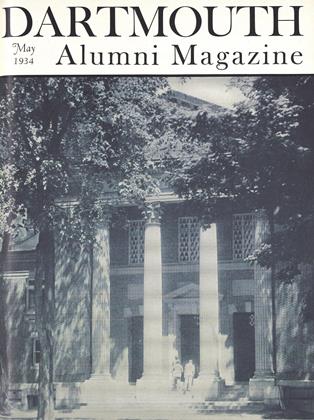ANYONE WHO reads Chapman's Alumni of Dartmouth College will be struck with the fact that the early College turned out large numbers of professional men. Lawyers, doctors, ministers, all seem to predominate in number in the first half of 19th century classes. From the professions, men went into allied activities which have since become professions in themselves. The educator was usually a man of theological training, professors and teachers were trained for the pulpit and could easily fill a local vacancy in the church for a time if the minister were called away or ill or unable for one reason or another to appear. The religious element was strong in the spirit with which learning was administered. Today the liberal college still stands on the threshold of the professions though it seeks in no way to encroach upon professional training. It has no wish to do so, and feels that its province has changed mightily since the earlier days when the graduate of a college was all but ready to enter a law office or embark as a missionary.
What is the training then that the College offers? That is of course an enormous subject with so many implications that no single discussion can even touch upon an underlying theory. Yet it seems that the College is embarked upon the process of furnishing a background for the future practice of a profession, or for a career in business or journalism or scholarship. The too narrowing process of a thorough training in one single operation might leave a student in the same position as the man who learns a single operation of piecework in a large factory. The changing world leaves such men far behind in an incredibly short time. The technically perfect man can climb poles and repair wires and grease machines for the whole period of his life if he specializes only on these things.
For the man who has the advantage of a college education the opening of a huge vista of possibility is preferable; in the College he may come in contact with men who have entered into some degree of specialization in the fields in which they work; these men can not train the student to become at once proficient and expert in these fields, nor do they wish to. They and the student's own ambitions and work will enlarge the student's view and deepen the background by the suggestion of new possibilities. They can offer the lessons of example and show fields in which endeavor may be carried on, and in some cases they can unite the ancient and the modern world in theory and example and help to throw some light upon the path of the student who, like most people in the modern world, is floundering in doubt, questioning the virtues and values of the past, and groping for some firm ground on which to make his first step.
 View Full Issue
View Full Issue
More From This Issue
-
 Article
ArticleHANOVER BROWSING
May 1934 By Rees H. Bwen -
 Class Notes
Class NotesClass of 1910
May 1934 By Hanrold P. Hinman -
 Class Notes
Class NotesClass of 1918
May 1934 By Allan C. Gottschaldt -
 Class Notes
Class NotesClass of 1905
May 1934 By Arthur E. McClary -
 Class Notes
Class NotesClass of 1933
May 1934 By John S. Monagan -
 Class Notes
Class NotesClass of 1929
May 1934 By F. William Andres







